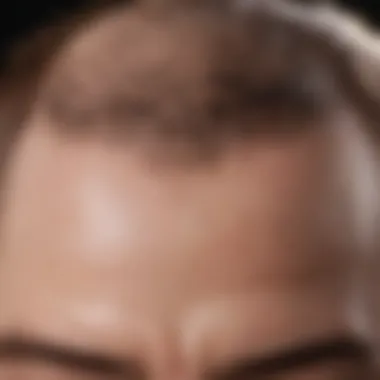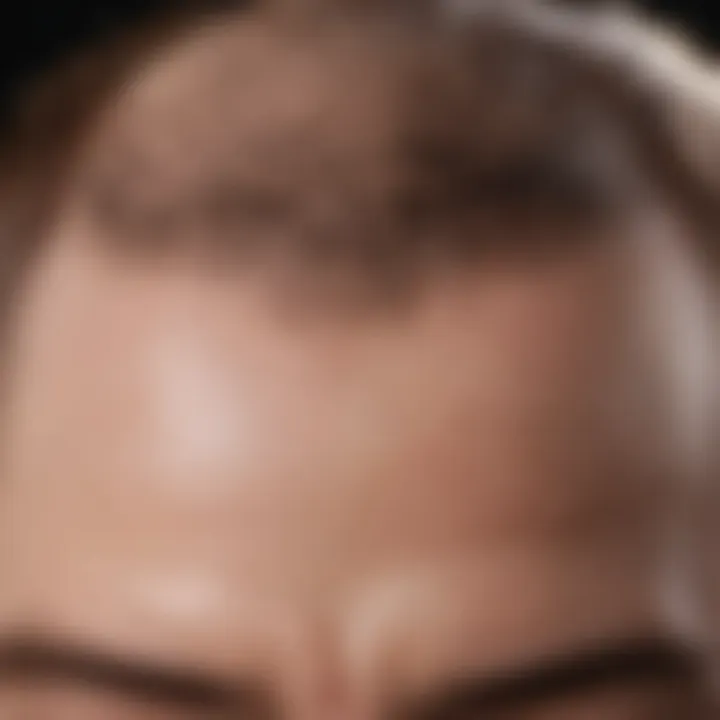Understanding Itchy Scalp and Hair Loss Causes


Intro
The experience of an itchy scalp combined with hair loss presents a dual dilemma that many individuals encounter. These issues, while frequently overlooked, hold substantial relevance in today’s society, affecting not only physical health but also psychological well-being. This article aims to dissect the complexities surrounding itchy scalp and hair loss, highlighting significant factors that contribute to these conditions. By examining dermatological conditions and lifestyle implications, we hope to provide readers with a deeper understanding of scalp health and effective strategies to address these concerns.
Scope of Discussion
In this discussion, we will delve into both the causes of an itchy scalp and the associated risk of hair loss. Various dermatological issues such as eczema, psoriasis, and seborrheic dermatitis will be explored, shedding light on how these ailments impact scalp and hair integrity. Additionally, we will assess the role of lifestyle factors, including diet, stress, and hair care practices that can exacerbate these conditions.
Equally significant are the psychological aspects tied to these physical symptoms. The relationship between stress, anxiety, and hair health showcases the intricate interplay between mental and physical wellness. Understanding this connection is vital for developing comprehensive treatment plans.
Through this exploration, we aim to differentiate between common misconceptions and established facts about itchy scalp and hair loss, emphasizing the importance of seeking professional advice. Preventive measures, alternative therapies, and established treatments will be addressed, allowing readers to equip themselves with knowledge crucial for maintaining scalp health and hair retention.
Prelude to Scalp Health and Hair Loss
The relationship between scalp health and hair loss is complex and multifaceted. Understanding this connection is vital for anyone experiencing scalp conditions or thinning hair. Healthy scalp can provide a robust foundation for hair growth, while an unhealthy scalp may contribute to various hair loss issues. This section emphasizes the need to address both scalp and hair concerns as part of a comprehensive approach to hair health.
The Importance of Scalp Health
Scalp health plays a crucial role in maintaining optimal hair quality and growth. A healthy scalp is characterized by a balanced microbiome, proper blood circulation, and minimal irritation. When the scalp is compromised, several issues can arise, including dryness, inflammation, and excessive oil production. These conditions often result in itchiness, which can lead to scratching and hair breakage.
Moreover, an unhealthy scalp can inhibit hair follicles from functioning optimally. It can block follicles with dead skin cells, oils, and products. This blockage can stunt hair growth and contribute to conditions like alopecia.
A proactive approach towards scalp care can lead to several benefits:
- Improved Hair Growth: Keeping the scalp clean and healthy allows hair follicles to thrive, potentially enhancing hair growth.
- Reduced Itchiness and Irritation: Proper care can help alleviate symptoms of itchiness, making it easier to manage the scalp.
- Stronger Hair: A nourished scalp supports the development of stronger and healthier strands, reducing hair loss in the long term.
Overview of Hair Loss Trends
Hair loss is a common concern affecting people of all ages, genders, and backgrounds. It can occur due to a variety of factors, encompassing genetic predisposition, medical conditions, and environmental influences. Recognizing current trends in hair loss can help individuals understand their experience and seek appropriate treatment.
Recent studies indicate that a significant percentage of the population experiences hair thinning or loss at some point in their lives. Factors contributing to hair loss include:
- Genetics: Conditions like androgenetic alopecia demonstrate a hereditary pattern, affecting both men and women.
- Hormonal Changes: Events such as pregnancy, menopause, and thyroid issues can significantly influence hair growth cycles.
- Lifestyle Factors: Nutrition, stress, and hair care practices can affect hair condition.
Understanding these trends is critical for addressing personal concerns. Awareness can motivate individuals to seek solutions early. A sensitive approach to both scalp health and hair loss can lead to more effective strategies for prevention and treatment.
Common Causes of Scalp Itchiness
Scalp itchiness is a frequent issue that many individuals experience. Understanding the causes of an itchy scalp is essential, as it can pave the way for effective treatment and improved scalp health. In this section, we will discuss the primary contributors to scalp itchiness. Some factors are dermatological in nature, while others stem from allergic reactions or are influenced by environmental conditions.
Dermatological Conditions
Dandruff
Dandruff is one of the most common causes of itchy scalp. It is characterized by the shedding of dead skin cells from the scalp. This flaking can lead to discomfort and irritation. Dandruff can be caused by various factors like dry skin, seborrheic dermatitis, or fungal infections. Its prevalence makes it a significant focus in discussions around scalp health. One unique feature of dandruff is its manageability; a variety of over-the-counter shampoos can effectively treat it. However, if not addressed, it can exacerbate scalp itchiness and insecurity.
Eczema
Eczema is a skin condition that can affect the scalp as well. It leads to inflamed, itchy skin, and may also produce red patches. This condition is often chronic and can occur alongside other allergies. Eczema's impact on the scalp can lead to consistent discomfort and frustration. Its commonality warrants attention in any discourse about scalp health. The major advantage of identifying eczema as a cause is the potential for targeted treatment options, including medicated creams. However, it may require ongoing management and can be challenging for some individuals to tolerate.
Psoriasis
Psoriasis is another significant dermatological condition that influences scalp itching. It is an autoimmune disorder that showcases raised, red patches covered with silvery-white scales. Individuals with psoriasis can experience not only discomfort but also substantial emotional distress from visible symptoms. The key characteristic of psoriasis is its chronic nature and potential for flare-ups, making it a recurring concern. Among its challenges, managing psoriasis effectively may involve a combination of medical treatments and lifestyle adaptations, such as dietary changes. Understanding psoriasis' role in scalp health is crucial for developing effective interventions.
Allergic Reactions
Allergic reactions are often overlooked but can play a major role in causing scalp itchiness. These reactions may occur due to specific hair care products, dyes, or ingredients. When the scalp encounters allergens, it can react with inflammation, leading to irritation. Recognizing this cause can help individuals make informed choices about what products to use or avoid. Seeking guidance from professionals can assist in identifying specific allergies and suggest treatment options to alleviate the discomfort.
Environmental Factors
Humidity
Humidity is a notable factor contributing to an itchy scalp. It can cause excess oil accumulation, making the scalp feel greasy and uncomfortable. In humid conditions, sweat and oil can lead to fungal growth, exacerbating itchiness. Managing humidity is important, especially for individuals who live in tropical or subtropical climates. While natural, it can have physical consequences on scalp health that must be monitored.
Pollution
Pollution is another environmental factor that often causes scalp itchiness. Dust, smoke, and other particulates can infiltrate the hair and irritate the scalp. This exposure can lead to a compromised scalp barrier, making irritation more likely over time. Understanding its impact allows individuals to take preventive measures, such as regular washing of hair and scalp to remove particulates. Pollution's contribution is an increasingly relevant concern as urban areas continue to experience rapid environmental changes.
Common Causes of Hair Loss
Understanding the common causes of hair loss is essential for finding effective treatments and preventive measures. Hair loss can affect self-confidence and overall well-being. By identifying specific factors, individuals can make informed decisions about their health. Furthermore, researching the causes can lead to deeper insights into scalp health, informing better care practices.
Genetic Factors
Genetics plays a significant role in hair loss for many people. It helps explain why some individuals experience thinning hair or baldness earlier than others.
Androgenetic Alopecia
Androgenetic alopecia, commonly known as male or female pattern baldness, is a major cause of hair loss. This condition stems from genetic factors and hormone levels. The key characteristic is a gradual thinning of hair, typically beginning at the hairline or crown. This condition is beneficial to discuss in this article because it accounts for a large percentage of hair loss cases. Its unique feature is its hereditary nature, meaning if a family member has it, you might be more likely to experience it too. However, the disadvantage is that it often leads to irreversible hair loss, making early attention critical.
Family History
Family history is crucial in understanding hair loss. A person's risk of experiencing hair loss increases significantly if relatives have faced similar issues. The key characteristic of family history is its predictive value in assessing personal risk. This element is important for readers as it promotes awareness of potential hereditary issues. Additionally, it informs proactive measures; knowing one’s family history can guide individuals to consult with healthcare professionals sooner. The primary disadvantage is that while it may provide clarity, it does not offer direct solutions to those affected.


Hormonal Changes
Hormones can greatly influence hair growth and loss. Variations in hormone levels often result in noticeable changes in both men and women.
Thyroid Disorders
Thyroid disorders, such as hypothyroidism and hyperthyroidism, are linked to significant changes in hair health. These disorders lead to hormonal imbalances, which can cause hair thinning or loss. The key characteristic of thyroid disorders is their ability to affect numerous bodily functions, including metabolism and hair growth. Discussing thyroid issues is beneficial as they are often treatable, thus offering potential for hair restoration. The unique feature is that hair loss from thyroid problems can often be reversed once treatment is effectively initiated, allowing individuals to regain their hair as hormone levels stabilize. However, identifying and treating thyroid conditions may take time and require ongoing medical supervision.
Pregnancy
Pregnancy involves complex hormonal changes that can lead to various scalp and hair health changes. Many women experience hair growth during pregnancy, but this may lead to temporary loss after childbirth when hormone levels drop. The key characteristic of pregnancy influencing hair loss is the fluctuating hormone levels that impact hair follicles. This aspect is relevant as it helps explain the different hair experiences women have over their lives. The unique feature of pregnancy-related hair loss is its temporary nature; while this may be disconcerting, it often stabilizes naturally. However, not all women share the same experience, leading to uncertainty about personal outcomes.
Medical Conditions
Certain medical conditions can directly lead to hair loss. Understanding these conditions helps in recognizing symptoms early on.
Autoimmune Disorders
Autoimmune disorders, such as alopecia areata, occur when the immune system mistakenly attacks hair follicles. This can lead to sudden hair loss in patches. The key characteristic of autoimmune disorders is their unpredictable nature, making this discussion vital for awareness and prompt diagnosis. This information is beneficial because recognizing the signs can lead to early intervention. The unique feature of autoimmune hair loss is that it can sometimes be reversed, but in other cases, it may lead to chronic loss. Thus, individuals may benefit from understanding treatment options available.
Chronic Illnesses
Chronic illnesses such as diabetes, lupus, or other long-term conditions can also impact hair health. These health issues often lead to hormonal imbalances or nutrition deficiencies that directly contribute to hair loss. A critical characteristic of chronic illnesses is their ongoing nature and the cumulative impact they have on overall health. Discussing chronic illnesses is beneficial to raise awareness of how overall wellness is tied to hair health. The unique feature here is that managing the primary illness often leads to improvements in hair quality and growth. However, the downside is that managing chronic conditions can be complex and require thorough medical management.
Lifestyle Factors Influencing Scalp and Hair Health
The state of your scalp and hair does not solely depend on genetics or treatments. Lifestyle factors play a significant role. This section aims to explore how nutrition, psychological aspects, and hair care practices influence scalp health and hair retention.
Nutrition and Dietary Patterns
Importance of Vitamins and Minerals
Vitamins and minerals provide the essential nutrients needed for healthy hair growth. For instance, Vitamin E is known for its antioxidant properties. It helps protect the scalp from oxidative stress, which can lead to hair loss. A deficiency in minerals like zinc and iron may contribute to scalp issues and hair thinning. These elements are critical for maintaining adequate blood circulation to the hair follicles, thus supporting growth.
Incorporating foods rich in these nutrients into your diet can be a beneficial choice for overall scalp health. Such nutrients not only enhance hair strength but can also improve its appearance. Vitamins and minerals enable the body to function optimally, reducing the chances of experiencing hair loss due to deficiencies.
Hydration
Hydration is crucial in maintaining scalp health and ensuring hair retains its strength. Water intake affects skin hydration, including the scalp, which can alleviate itchiness and dryness. When the scalp is adequately hydrated, it promotes a favorable environment for hair follicles, minimizing conditions that lead to hair loss.
In addition, the skin’s ability to repair itself increases when hydrated. This can be significant for those experiencing scalp conditions like psoriasis or eczema. While staying properly hydrated is simple, many overlook this basic necessity, making it an essential aspect of maintaining healthy hair and scalp.
Stress and Psychological Factors
Stress-Induced Hair Loss
Stress can have a profound impact on hair loss. Conditions like telogen effluvium occur when stress pushes hair follicles into a resting phase, leading to increased shedding. This phenomenon can become complicated, as the stress of hair loss might further exacerbate anxiety or worry, creating a cycle.
Understanding the role of stress is vital in addressing hair health. Techniques such as meditation, yoga, and regular physical activity can help manage stress levels. By incorporating these practices, one might reduce the risk of stress-induced hair loss, fostering a more stable environment for hair regrowth.
Mental Health Connections
Mental health plays a significant role in general well-being and, by extension, scalp and hair health. Conditions such as anxiety and depression may lead to neglect of self-care routines, including hair care. The resulting lack of proper care can cause various issues like hair thinning and scalp irritations.
Addressing mental health with professional help can be a beneficial step towards restoring both psychological and physical aspects of health. Furthermore, holistic approaches, like counseling and support groups, provide methods to help individuals maintain better hair and scalp care routines and find encouragement in managing their conditions.
Hair Care Practices
Shampoos and Conditioners
Selecting the right shampoos and conditioners is essential for maintaining scalp health. Products containing harsh chemicals can strip natural oils and lead to dryness and irritation. On the other hand, products featuring natural ingredients can help maintain the scalp's health by providing moisture and nutrients.
Organic shampoos often exclude sulfates and parabens, making them popular among individuals looking to prevent potential irritation. They also promote scalp balance, which can be a vital factor in preventing itchiness and hair loss. Paying attention to product labels can significantly impact scalp health.
Styling Products and Treatments
The choice of styling products and treatments can either contribute to or detract from scalp health. Many common styling products contain alcohol and other chemicals that can dry out hair and scalp, leading to flakiness and irritation. Instead, consider options like natural hair oils and treatments that nourish without causing buildup.
It is advisable to rotate styles and let hair rest from harsh treatments. This practice can prevent damage and promote healthier growth over time. Being mindful of styling practices aids in creating a routine that supports your hair and scalp needs.
Assessment and Diagnosis
Assessment and diagnosis of scalp itchiness and hair loss are crucial steps towards effective management of these conditions. Proper evaluation helps to ascertain the underlying causes, guiding the choice of appropriate treatments. Consulting the right healthcare professionals can streamline this process and provide clarity on complex dermatological issues. A tailored diagnosis can significantly enhance treatment efficacy, ultimately reducing frustration and improving overall quality of life.
Consulting Healthcare Professionals
Dermatologists
Dermatologists are specialists trained in skin and hair conditions. They possess extensive knowledge about scalp health, which is vital for diagnosing and treating issues like scalp itchiness and hair loss. One key characteristic of dermatologists is their ability to perform a thorough clinical examination, helping them identify possible dermatological conditions quickly. This is beneficial for individuals experiencing symptoms that could stem from complex skin disorders.
Dermatologists utilize various diagnostic tools and techniques. Their unique approach often includes both medical and surgical treatments, which can address a wide range of concerns. However, one limitation is that sometimes, patients may require referrals to more specialized professionals when the issues are particularly intricate.
Trichologists


Trichologists are specialists who focus on hair and scalp problems primarily. They often assess hair health comprehensively, which makes their role essential in understanding hair loss and related issues. The fundamental characteristic of trichologists is their specialized knowledge about hair structure, growth patterns, and potential diseases affecting them. This makes them a highly beneficial choice for those looking for tailored suggestions regarding hair health.
Trichologists emphasize personalized assessments, appreciating the different factors that affect an individual’s hair. However, trichologists generally do not perform medical treatments, which can be both an advantage and a disadvantage. For some, having a more focused evaluation without medical intervention is a plus, while others may need to seek additional medical care.
Diagnostic Tests and Evaluations
Evaluating scalp conditions often requires diagnostic tests. These tests can provide a clearer picture of the underlying issues, ensuring that appropriate treatment protocols are implemented.
Scalp Biopsy
A scalp biopsy is a specific diagnostic procedure that involves removing a small sample of scalp tissue for analysis. This test plays a crucial role in confirming various dermatological conditions that may not be visible through standard examination. The key characteristic of a scalp biopsy is its ability to provide definitive insights into conditions such as infections or skin disorders. It is a commonly employed technique in dermatology, making it a beneficial choice in confirming a diagnosis.
The uniqueness of this procedure lies in its ability to identify specific cellular or structural issues occurring at the microscopic level. While it can be an invasive process, the advantages often outweigh the discomfort, as it leads to more accurate treatment strategies.
Blood Tests
Blood tests also serve as a vital tool for diagnosing scalp and hair issues. They can check for nutritional deficiencies, hormonal imbalances, or signs of systemic diseases that may contribute to hair loss or itching. A key characteristic of blood tests is their non-invasive nature, making them easy to administer.
These tests are beneficial for creating a broad profile of an individual’s health, which can directly impact hair and scalp conditions. Unique to blood tests is their ability to flag underlying health issues that might not be evident through physical examination alone. However, results need professional interpretation, and patients may need further tests based on initial findings, which can introduce some delays in diagnosis and treatment.
Treatment Options for Itchy Scalp
Dealing with an itchy scalp can be distressing and impact overall hair health. Understanding treatment options for itchy scalp is essential for alleviating discomfort and preventing hair loss. The approach to treatment can range from over-the-counter solutions to prescription medications and natural remedies. Each option has its merits and limitations, which makes it critical to assess them carefully based on individual needs.
Over-the-Counter Solutions
Medicated Shampoos
Medicated shampoos are often one of the first recommendations for an itchy scalp. They contain active ingredients like zinc pyrithione, ketoconazole, and selenium sulfide. These ingredients target fungi and bacteria that can contribute to scalp conditions. The key characteristic of these shampoos is their ability to reduce inflammation and combat microbial growth.
Medicated shampoos are beneficial for their ease of use and availability without a prescription. They can provide immediate relief for conditions like dandruff or seborrheic dermatitis due to their formulation.
However, overuse of these products might lead to dryness or irritation if not followed with a suitable conditioner. It is crucial to choose the right type based on the specific scalp issue, and consult a healthcare professional if symptoms persist.
Topical Treatments
Topical treatments like lotions and scalp sprays serve as an adjunct to shampoos. They often contain soothing components such as tea tree oil or menthol, which can provide a cooling sensation and reduce itching. The significant aspect here is direct application to the affected areas, providing targeted relief.
These treatments are popular for their simplicity and immediate effect. Many users appreciate their non-intrusive nature and quick application.
Nonetheless, it is important to be mindful of potential allergies to certain ingredients. Users should carefully read labels and patch-test new products before widespread application.
Prescription Medications
Corticosteroids
Corticosteroids are often prescribed for severe cases of scalp itchiness, especially when due to inflammatory conditions like eczema. They work by reducing inflammation and suppressing the immune response in the affected areas. A primary advantage of corticosteroids is their effectiveness in rapidly relieving symptoms.
However, prolonged use can lead to skin thinning or other side effects, so it is essential to follow the prescribed regimen. Patients must communicate with their healthcare provider regarding any changes in symptoms to adjust treatment as necessary.
Antihistamines
Antihistamines can also be an option for treating an itchy scalp, especially if the cause is allergy-related. They work by blocking histamine, a substance released during allergic reactions. The key characteristic of these medications is their ability to relieve itchy sensations effectively.
Antihistamines are particularly beneficial for patients who experience itching at night, as they may cause drowsiness. Nonetheless, they are not a standalone treatment for scalp conditions but can complement other therapies. Users should be cautious of side effects like sedation or dry mouth.
Home Remedies and Natural Solutions
Essential Oils
Essential oils such as lavender and peppermint have gained popularity for scalp treatment. Beyond aroma benefits, these oils can soothe the scalp and reduce itchiness due to their anti-inflammatory properties. Essential oils can promote relaxation, making them a favorable choice for those who prefer natural remedies.
However, essential oils should always be diluted with a carrier oil before application to avoid irritation. Additionally, individuals with sensitive skin must proceed with caution, as reactions can occur.
Aloe Vera
Aloe Vera is another natural solution with soothing properties. It can hydrate the scalp and provide relief from itching. Its key feature lies in its ability to coat the scalp, reducing irritants from causing further discomfort. It is widely regarded as safe and has minimal side effects.
While Aloe Vera can be beneficial for a dry or irritated scalp, it might not address deeper issues like fungal infections. Therefore, it is essential for users to define their scalp health goals before relying solely on Aloe Vera.
Addressing itchy scalp through appropriate treatments is crucial not only for comfort but also for preventing hair loss that can arise from persistent scratching and irritation.
Treatment Options for Hair Loss
Hair loss can create significant concern for individuals, impacting self-esteem and overall well-being. This section examines various treatment options available, providing insight into their applications, effectiveness, and potential considerations. Understanding these treatment options is vital as they can address different underlying causes of hair loss, helping individuals regain their confidence and restore healthier scalp and hair conditions.
Medications
Minoxidil
Minoxidil is a topical solution widely used to treat hair loss, especially androgenetic alopecia. Its primary mechanism involves stimulating hair follicles, promoting hair regrowth. This treatment is well known for its easy application and is available over the counter. One key characteristic of minoxidil is its dual ability to not only enhance hair growth but also potentially increase the thickness of existing hair. Its non-invasive nature makes it a popular choice for many.
However, minoxidil prices can vary, and people may experience some side effects, such as itching or dryness at the application site. Consistency in its application is crucial, as discontinuation may lead to loss of newly grown hair.


Finasteride
Finasteride is an oral medication that specifically targets hormonal activity causing hair loss. By inhibiting the conversion of testosterone to dihydrotestosterone, it reduces hair thinning in men with male pattern baldness. This medication is recognized for its effectiveness in stabilizing hair loss and promoting regrowth.
One of the main advantages of finasteride is its ease of use, requiring only a daily pill. However, potential side effects include sexual dysfunction and mood changes, which can be concerning for some users. Regular monitoring by healthcare professionals is advisable when using this medication.
Surgical Interventions
Hair Transplants
Hair transplant involves moving hair follicles from donar sites to balding areas. It is often regarded as a permanent solution to hair loss. The procedure can lead to natural-looking results and has become increasingly popular due to advancements in techniques.
The key characteristic of hair transplants is their ability to utilize the patient’s own hair, minimizing risks of rejection. However, the procedure is typically invasive, requiring downtime for recovery. Additionally, it can be expensive, making it a significant investment for many
Scalp Reductions
Scalp reduction is a surgical method that removes balding areas of the scalp and brings together the hair-covered sections. This approach is less common today but was once a prevalent option. The primary characteristic of scalp reduction is its ability to directly reduce the size of bald patches.
While this can lead to improvement in hair density, the procedure involves surgical risks, including complications like infection and scarring. Long-term results and overall satisfaction can vary, leading many to seek alternative options.
Alternative Therapies
Platelet-Rich Plasma Therapy
Platelet-rich plasma (PRP) therapy involves drawing and processing a small amount of the patient’s blood to extract platelets, which are then injected into the scalp. This procedure is thought to promote healing and stimulate hair follicles. Prominent for its natural approach, PRP therapy has become increasingly popular among individuals seeking non-surgical solutions.
One significant aspect of PRP therapy is its minimal invasiveness. Patients appreciate it for being a natural alternative without introducing synthetic substances. However, results can vary, with some individuals experiencing delayed improvement or needing multiple sessions for optimal effects.
Low-Level Laser Therapy
Low-level laser therapy (LLLT) utilizes specific wavelengths of light to stimulate hair follicles. It is a non-invasive treatment option that aims to improve hair growth and overall scalp health. The convenience of LLLT, often delivered through handheld devices or caps, makes it appealing.
The key feature of LLLT is its safety, as it does not produce harmful side effects unlike some conventional therapies. Nevertheless, the effectiveness can vary among individuals, and it may require ongoing treatments to maintain results.
In summary, treatment options for hair loss encompass a wide range of possibilities, each with unique attributes and considerations. It is crucial for individuals to consult healthcare professionals to determine the best method based on their specific condition.
Preventive Measures and Best Practices
Preventive measures and best practices play a crucial role in maintaining both scalp health and hair retention. Recognizing the early signs of scalp issues and hair loss can help mitigate long-term damage. Implementing routine scalp care and adopting healthy lifestyle choices are key strategies to prevent these conditions. It is not just about treating the symptoms but also fostering an environment where the scalp and hair can thrive.
Routine Scalp Care
Regular Cleansing
Regular cleansing is essential for removing dirt, excess oil, and product buildup from the scalp. This process is vital for maintaining a clean environment for hair follicles, which can promote healthy hair growth. Over time, failure to cleanse the scalp properly can lead to clogged hair follicles, potentially causing hair loss. One key characteristic of regular cleansing is its ability to prevent the buildup of sebum and dead skin cells, which are common contributors to scalp issues like dandruff.
Using a gentle shampoo that is appropriate for your scalp type can be a beneficial choice. Many individuals tend to overlook the importance of scalp cleanliness, yet it directly impacts hair health. One unique feature of regular cleansing is its customization; it can be tailored to individual needs, like using sulfate-free products for sensitive skin. However, excessive washing can strip natural oils, so finding the right balance is critical.
Exfoliation
Exfoliation involves the removal of dead skin cells from the scalp. This practice can contribute significantly to overall scalp health by promoting circulation and allowing new hair growth. The key characteristic of exfoliation is its ability to rejuvenate the scalp, clearing away debris that regular washing might miss. It can also help alleviate itchiness associated with conditions like psoriasis.
Exfoliating can be a popular choice among those looking to enhance their scalp health, as it works to maintain follicle health and potentially improve hair quality. Unique aspects of exfoliation include various methods, from physical scrubs to chemical exfoliants like salicylic acid. One disadvantage, however, is the potential for irritation if not done cautiously, especially for those with pre-existing scalp conditions. Successful exfoliation requires attention to the scalp type and particular needs of the individual.
Healthy Lifestyle Choices
Balanced Diet
A balanced diet significantly impacts scalp and hair health. Incorporating a variety of vitamins and minerals can enhance the body's ability to maintain healthy hair follicles. A key characteristic of a balanced diet is its provision of essential nutrients such as biotin, zinc, and vitamins A and E, all of which support hair strength and vitality.
Including leafy greens, nuts, and lean proteins can be beneficial for anyone focused on sustaining healthy hair and scalp. What sets a balanced diet apart is its comprehensive nature; it effects not only the hair but the entire body. Neglect in this area can lead to deficiencies that may exacerbate hair loss issues, highlighting the importance of nutritional awareness in one's overall hair care regimen.
Regular Exercise
Regular exercise enhances blood circulation, which can benefit the scalp by delivering nutrients efficiently to hair follicles. The primary characteristic of regular exercise is its positive effects on overall wellbeing, including stress reduction. Engaging in physical activity can also balance hormones that impact hair loss, making it an important component of hair health.
Exercise takes various forms, from cardio to strength training, and each can have different benefits. Generally, maintaining an active lifestyle not only supports hair health but also encourages holistic wellness. One potential disadvantage to note is the risk of overexertion or injury, which could counteract the benefits if not managed properly.
A proactive approach through routine scalp care and healthy living can significantly reduce the likelihood of scalp and hair issues.
In summary, implementing these preventive measures is essential for minimizing scalp itchiness and hair loss. A combination of proper cleansing, exfoliation, a balanced diet, and regular exercise creates a strong foundation for healthy hair and scalp.
Closure
The conclusion serves as a vital closure point for the entire discussion on scalp itchiness and hair loss. Summarizing this topic not only helps reinforce key ideas but also emphasizes the implications for those facing these issues. As previously explored, both scalp health and hair retention are influenced by multiple factors, including dermatological conditions, environmental elements, and lifestyle choices. Thus, recognizing and addressing these specific elements can lead to improved outcomes for individuals experiencing these problems.
In light of the comprehensive guide provided, it becomes clear that understanding these intricacies can empower individuals to seek appropriate treatments and preventive measures effectively. Knowledge about various conditions—such as dandruff, eczema, or genetic predispositions to hair loss—allows individuals to make informed decisions about their care approach. Additionally, the significance of consulting healthcare professionals can never be overstated, as they can offer tailored plans that address both the underlying causes and symptoms.
The integration of holistic prevention strategies forms an essential part of scalp and hair health maintenance. These measures, conveyed throughout the article, enable individuals to take proactive roles rather than reactive stances in their care regimens. Ultimately, a well-rounded understanding and approach can contribute to lasting improvements in one's scalp and hair condition.
Summary of Key Points
- Scalp health and hair retention are interlinked concepts that can be affected by numerous factors.
- Common dermatological conditions can lead to scalp itchiness and should be properly diagnosed for effective treatment.
- Lifestyle choices, including nutrition and stress management, are crucial in maintaining a healthy scalp and hair.
- Consulting healthcare professionals aids in obtaining accurate diagnoses that are essential for effective treatment and care.
- Preventive measures and routine care practices can significantly mitigate problems related to scalp itchiness and hair loss.
Significance of Addressing Scalp and Hair Issues
Addressing issues related to scalp itchiness and hair loss is not merely a cosmetic concern; it impacts emotional well-being and quality of life. Hair plays a significant role in personal identity and self-esteem, making it critical for individuals to resolve these issues when they arise. As mentioned in earlier sections, underlying conditions often affect physical and mental health. Therefore, managing scalp and hair problems can contribute to improved overall health.
"A proactive approach to scalp care can lead to significant improvements in hair health and emotional well-being."
Furthermore, by acknowledging the significance of these issues, society can foster empathy and understanding towards those affected. Empowering individuals through education about these topics encourages proactive care measures. As the awareness about scalp and hair health grows, so will the resources and community support available for individuals navigating these challenges. Focusing on these elements collectively enhances not only individual health but also promotes a broader conversation around self-care in the contemporary landscape.















